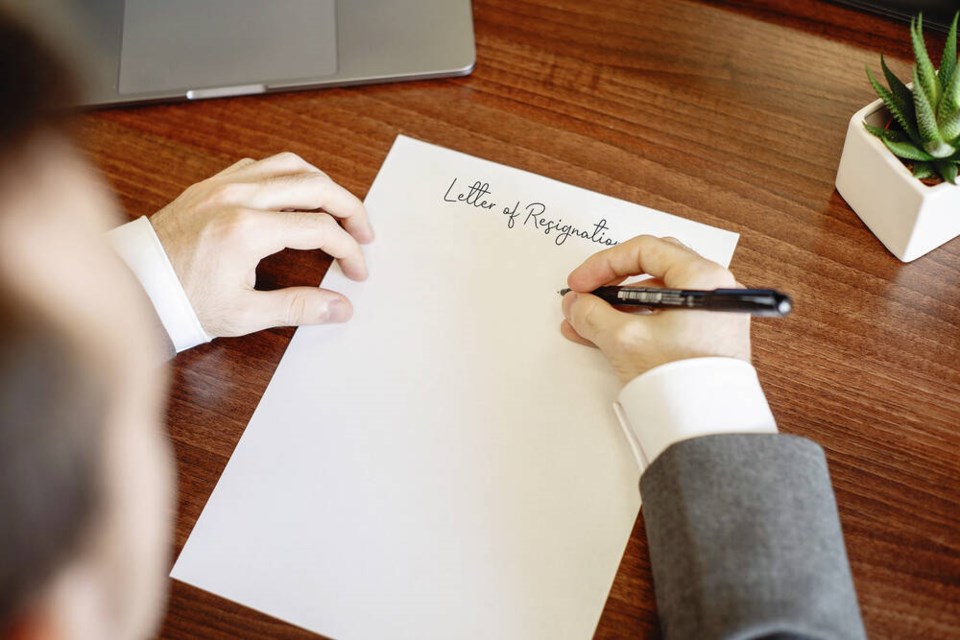We are now halfway through the month of January, and let me be the first to say: Way to go! I like you and I like your chances of navigating the rest of the coming year, which, as for so many Vancouver Islanders, will probably include one of the following:
• Changing your job,
• Complaining about bike lanes,
• Formally explaining to the police why you did what you did in Nanaimo.
The common link between these important activities is they all require you to write a formal letter. You will need a pen and paper, of course, but how best to begin?
How you address a letter depends on to whom you are writing, but generally it’s someone you barely know and/or like. Otherwise, you would text them or send a TikTok video with your latest dance moves.
The beginning of a letter is called the “salutation,” and the ending is called the “valediction.” Each word is derived from Latin: salus, a greeting, and valere, to be healthy.
If you are writing a business letter, you won’t go wrong with a simple approach: “Dear [Name].”
Acceptable variants include “Hello [Name]” and “Hi [Name].”
This is particularly effective if you are dealing with someone whose legal name is “[Name],” or when you don’t actually know the person’s name, for example when you are drafting a bank robbery note but have not been formally introduced to the teller.
Some experts suggest “Dear” is becoming a little old-fashioned, especially when combined with “Sir or Madam,” a common salutation used by people who want to show respect, but are far too lazy to look up the real name of the person.
This is also a good method to follow when you don’t know the gender or species of the person you are writing.
Many Western names can be either male or female: Alex, Sam, Kim, TinyPonyDancer69.
Names from other cultures can also be quite impenetrable, such as Rasmata Ouedraogo, a popular name and tropical skin condition in Burkina Faso.
Experts suggest you avoid titles that specify marital status. Instead of “Mrs.” use the less-specific “Missy” or “Hey, Baby, do those legs go all the way up?” Instead of “Mr.” use “Occupant” or “Dullard.”
The important thing to keep in mind is respect. Always respect. The salutation you use with your friends is not necessarily appropriate for business correspondence:
• Whazzup!
• Heeeeeeey gurrrrrrl
• WHERE IS MY MONEY?
“To whom it may concern…” sounds like it ought to be a good opener to a formal letter, but it is not because it answers its own question: Nobody. Certainly not me. I am totally unconcerned. Go away.
Once you pick your salutation, it’s time for the hard slogging through the middle bit of the letter, which should use words and phrases to make a point. Obviously, I can’t help you with anything like that.
Once all of that is finished, it’s time for the complimentary close. The valediction you use depends on a range of factors, including how formal the correspondence is.
For example, anything you apply for — jobs, loans, forgiveness — is more formal, whereas anything involving gossip about your new boss, haiku poetry or hockey-team cheers is less formal.
“Sincerely” is traditional but lacking in panache and authenticity. I have not been sincere since the late 1980s, and I think it shows in my correspondence and general deportment, so I avoid the word.
“Thanks” is the heavy favourite of cannibal psychopaths and director-level government staff (any government — municipal, provincial, federal — anywhere in the English-speaking world).
“Thanks” loosely implies gratitude, but is curt enough to subtly remind you nobody is actually thanking anybody for obeying the preceding orders, tout suite.
It is the passive-aggressive text equivalent of liberally slathering on sanitizer moments after shaking someone’s hand.
Using its minimalist cousin “Thx” just gets in the way of clear communication. It is very small, but suggests too many distracting possibilities: Does the writer think he is the King/Queen/coming American despot? Is he just a poor speller? It recalls that line from Henry VI, part II: Small things make base men proud.
“Best” — just the lone word — is also confusing, and probably the sign of some criminal pathology.
It’s a sneaky word that can be a verb (Can I best him in a rousing game of checkers?), noun (Clearly, he is the best), adjective (Because I am not the best player) or adverb (I am not your best bet).
We are only halfway through January, so there is still time for that “2023 in review” letter you promised to write in an attempt to explain why you a) did not travel to Alberta to visit relatives during the winter break; b) did not travel to Alberta to visit relatives during the summer break; and c) won’t be travelling to Alberta to visit relatives in 2024.
As with all difficult correspondence, my advice is to end that letter like I always do: “Love, Dave.”




